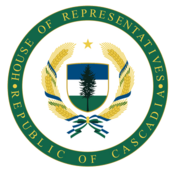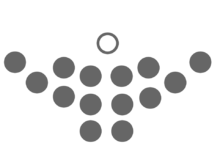Legislature of Cascadia: Difference between revisions
No edit summary |
No edit summary |
||
| Line 12: | Line 12: | ||
|leader2=AghastBlock<br>since June 20, 2023 | |leader2=AghastBlock<br>since June 20, 2023 | ||
|seats=15 | |seats=15 | ||
|lowerimage=[[File:15 | |lowerimage=[[File:15 Seat Cascadian House Seating Chart (1).png|220px]] | ||
|lower_political_groups=Nonpartisan (15) | |lower_political_groups=Nonpartisan (15) | ||
|lower_voting_system=[[Nonpartisan proportionality|Single transferable vote]] | |lower_voting_system=[[Nonpartisan proportionality|Single transferable vote]] | ||
Revision as of 08:56, 29 June 2023
This article is about the legislative body as a whole. For the current meeting, see the 11th Legislature of Cascadia.
| ||||||||||||||||||||||||||||||||||
The Legislature of Cascadia is the unicameral legislature of Cascadia, consisting of the Cascadia House of Representatives. It is has continuously operated since August 17, 2022, and is one of the only several directly elected legislative bodies on the server.
The House of Representatives consists of 15 representatives, however can be lowered or raised if it is deemed adequate by the legislature. All representatives are elected directly by the people in multi-member geographic electorates, each electing either 3 to 5 members to the House of Representatives, on the basis of Proportional Representation by means of the Single Transferable Vote. Political parties, while not banned, do not exist in Cascadia, and therefore the Legislature has a lot more of a collegial attitude than many other legislatures that have political parties or groups. Elections are held once a month, alongside elections for the President of Cascadia.
Powers and Duties
The House of Representatives's powers derive from its ability to to change the country's laws, and to amend the constitution (which requires a majority of two-thirds). In addition to these key powers, the constitution grants to the House extensive legislative powers and substantial control over the treasury, defense, the sole power to ratify treaties and other kinds of international agreements, and the duty to approve or reject decisions by the President to declare war and make peace. The legislature also has the sole authority over confirming the president's picks for all civil officers of the government, including their Executive Council, and has the sole power of Impeachment.
Structure and Electoral System
Speaker of the House
One member of the House is elected by the other representatives to serve as the Speaker of the House of Representatives to serve as its presiding officer, and presides over meetings of the legislature. They are the chief executive officer of the body as a whole, and represents the Legislature in that capacity. The legislature is constitutionally entitled to choose other officers as they may establish that could theoretically act in the absence of the Speaker, however that has not been done. The Vice President previously served ex officio as the President of the Legislature prior to the amendment to the constitution establishing the office of Speaker.
Apportionment
The House of Representatives does not have a constitutionally mandated number of seats in the House, and is decided by statute. The constitution, in Article III, Section 2, states that "the House of Representatives must be elected in a fair and proportional manner, however such specific manner may be determined by law." As of the latest election, and the number set for the upcoming election, the number of seats in the House of Representatives is 17, with several members elected from several geographic multi-member divisions, which are redrawn every so often to account for activity and population changes necessary to alter the boundaries. The Legislature's sole standing committee, the House Standing Committee on Apportionment, often called the Apportionment Committee, is responsible for making these changes and proposing them to the house prior to general elections, which to be approved must receive two-thirds of votes in the House. The Committee is made up of 5 members, chosen by the House as a whole mid-way through its legislative term, with the member receiving the most votes to be on the Committee becoming its Chair.
Electoral System
Under the Representation of the People Act, passed on September 3, 2022, each multi-member division, sometimes referred to as Electorates, Districts, or Constituencies, will return an equal number of members to the House of Representatives, and will as best as possible represent the activity and population of the nation. Prior to the Representation of the People Act, the election system under the provisional electoral law enacted by the Chief Councillor prior to the first election was a version of Score voting, in which each voter in their constituency ranked each candidate on a scale of 1, 2, 3, 4, and 5, with 5 being the greatest, and the scores of each candidate are tallied up, and the candidates receiving the most votes were elected to represent that Electoral division. That electoral system was used in the inaugural August 2022 elections; however under the Representation of the People act, that was altered for the upcoming September elections and all elections after, to a form of Nonpartisan Proportional Representation, by the means of the Single Transferable Vote, instead of the Plurality score system used earlier.

